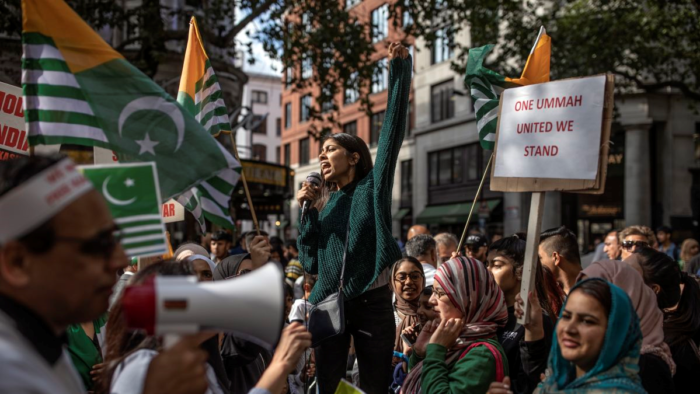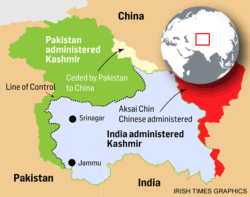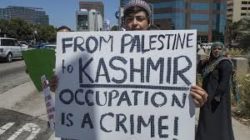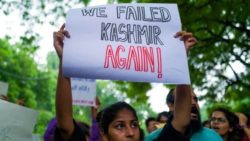Kashmir Militarisation and Discontent: Revoking Article 370

Protests for Kashmir ahead of the national security council meeting. CNN International, Aug 2019.
by Nayab Fahim
Most people are unaware of how the Kashmir conflict came into existence. The conflict is a result of a historical dispute between two nuclear armed neighbours: India and Pakistan. The conflict persisted with both countries claiming the region as their own, following partition in 1947. Maharaja Hari Singh decided to sign the instrument of ascension into India which ultimately led to India’s claim over two thirds of the region. Pakistan’s claim to the region came with the fact that the majority of residents were Muslims and so they should be bound by their Islamic laws. However, India remained determined on maintaining the land to promote its secular status. Pakistan retains one third of the land which has come to be known as ‘Azad (liberated) Kashmir’.

Map of territory control between three states. Irish Times, August 2019.
In this article, I will outline the issue of Kashmiri rights violations which has inevitably followed from recent Indian government decision to revoke the special status of Kashmir. Article 370 was a significant clause entrenched into the Indian constitution which granted certain autonomous rights under the special status recognition to the state of Jammu and Kashmir, which ascribed certain devolved powers to the state. So, here are a few questions of consideration: why is the clause relevant? What does it mean moving forward for the state of Kashmir and its people? And what does any of this have to do with the central topic of human rights?
Article 370 and its outline of Kashmiri rights as a minority state:
Well, the answer to why the clause is relevant is that Article 370 granted certain political rights to the region. Which was the result of the recognition that the state of Jammu and Kashmir, having a Muslim majority, is a distinct entity. Thereby, binding it solely to the Indian regime will make the Kashmiri people a minority. As a result of this recognition, the clause establishes that the state of Jammu and Kashmir will have a separate constitution and will have an elected assembly through which they can gain effective representation from regional governance. Now that Article 370 has been revoked by the government, Kashmir will have to abide fully to the Indian national constitution much like any other state in India making Kashmiris more of a minority.
Another notable implication of the revoking of Article 370 is that non-Kashmiris will now be able to purchase land in the region. This kind of implication is analogous to occupation as a form of human rights violation in the sense that it means that the people of India are now permitted to settle on land that is not rightfully theirs.

Image representing the occupation narrative (2019).
It was always part of Modi’s manifesto to revoke the article and so it is not surprising that he made this move. After all, it was the overall will of the majority at the expense of a minority.
Prior to the revoking of the article, Kashmiri regional government had relative autonomy over creating legislation around permanent residency, ownership of property and fundamental rights. Now that the national government holds all jurisdiction over these crucial sectors, the Kashmiris are permanently bound to the regime which has oppressed them for years. Instead of taking a step forward in terms of the liberties and rights of the Kashmiri people, the Indian government have indirectly declared that the Kashmiri people are still their people and will not gain any independence anytime soon.
The rights to self-determination:
What constitutes the violation of human rights? We can say intuitively, anything that simply undermines basic ideas around liberty. While the Kashmir independence movement has tremendous level of support from residents of the Valley; nothing is done to grant liberation to the state. According to the basic principles of sovereignty, a state has a right to determine its own fate. Yet, the cries of the Kashmiri people for independence are still overlooked and they are forced to submit to a regime which has oppressed them through intensive militarisation and suppression of their freedom of speech, and will inevitably continue to do so.
The Indian government has a continuing legacy of harsh militant tactics employed in the region in an attempt to control insurgency and cut down on terrorism in the Valley. This has led to reports of several human rights violations relating to physical torture of protesters and activists against the Indian regime, and unlawful arrest and detention of citizens. It seems clear that the widespread voice of discontent is prevalent along the valley and India’s use of force in the region and heavy policing tactics are clearly unlawful in the face of international human rights. A major example of crackdown tactics employed by Indian police and militants is the frequent use of pellet guns on protesters which has left many of the young protesters in the Valley fully or partially blind. These tactics of social control seem to obviously illustrate a violation of liberties to freely speak out against oppression and regimes.
The examples of crackdowns over the years only portray what we already know about Kashmiri people: they have an intangible right to self-determination. What needs to happen is that the Kashmiris need to be given the referendum they were promised years ago by the UN. Instead of progress in terms of the rights of Kashmiri people, the revoking of Article 370 clearly shows a further set back in granting Kashmiris the right to collective self-determination as a sovereign nation.
International response:
The statement by the International Federation for Human Rights’ (IFHR) second report on the human rights abuses is a collective representation of records from various different human rights groups and NGO’s such as the Asian Forum for Human Rights and Development (FORUM-ASIA) and World Organization Against Torture (OMCT). The report states that the Indian state operates by violating rights on a daily basis in Kashmir. The report highlights human rights violations such as unlawful killings, shooting of children, rape and disappearances.
Additionally, the report highlights the undemocratic nature of the Indian governments’ daily operations. It states that security personnel employed in the region operate with immunity from prosecution through the Armed Forces Special Powers Act (AFSPA), which prescribes that security forces can employ any means necessary to control insurgency in the region with legal impunity. These legal exemptions are intensively undemocratic as they don't subject security forces to be tried in regular courts. In terms of human rights, AFSPA is a direct obstruction to justice because despite the constant monitoring of human rights abuses in the region, not one official to date has been prosecuted or held to account for their harsh tactics.

Protests in India regarding Modi’s decision to revoke special status of Jammu & Kashmir. BBC, August 2019.
If Scotland is able to have a referendum on its fate to remain in the UK and if the UK can vote on whether or not they wish to remain part of the EU, I will end this post by asking you to think about why Kashmiris cannot or have not been able to vote on whether or not they wish to remain part of India or become a separate entity? What gives some states the inherent right to self-determination and not others? Lastly, how can we view democracy as an ideal concept yet still accept that some states cannot be allowed to access it?
Nayab Fahim, 3rd Year BA Philosophy and Politics Undergraduate.
